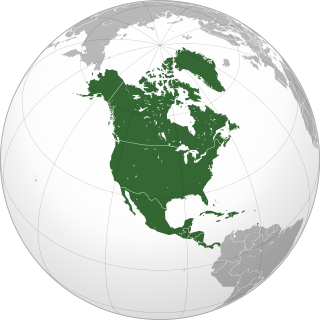
North America is a continent in the Northern Hemisphere and almost entirely within the Western Hemisphere. It can also be described as the northern subcontinent of a single continent, America. It is bordered to the north by the Arctic Ocean, to the east by the Atlantic Ocean, to the southeast by South America and the Caribbean Sea, and to the west and south by the Pacific Ocean. Because it is on the North American Tectonic Plate, Greenland is included as part of North America geographically.
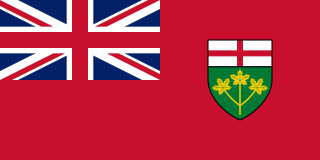
Ontario is one of the thirteen provinces and territories of Canada. Located in Central Canada, it is Canada's most populous province, with 38.3 percent of the country's population, and is the second-largest province by total area. Ontario is Canada's fourth-largest jurisdiction in total area when the territories of the Northwest Territories and Nunavut are included. It is home to the nation's capital city, Ottawa, and the nation's most populous city, Toronto, which is also Ontario's provincial capital.
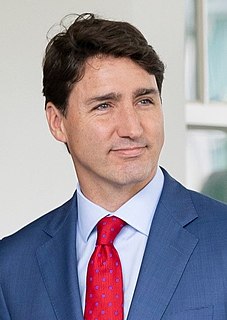
The prime minister of Canada is the first minister of the Crown. The prime minister acts as the head of government for Canada, chairs and selects the membership of the Cabinet, and advises the Crown on the exercise of executive power and much of the royal prerogative. As prime ministers hold office by virtue of their ability to command the confidence of the elected House of Commons, they typically sit as a member of Parliament (MP) and lead the largest party or a coalition in the House of Commons.

Joseph Philippe Pierre Yves Elliott Trudeau, also referred to by the initials PET, was a Canadian politician who served as the 15th prime minister of Canada and leader of the Liberal Party of Canada from 1968 to 1984, with a brief period instead as Leader of the Opposition in 1979 and 1980.
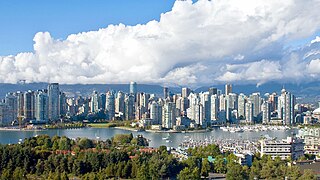
Vancouver is a major city in western Canada, located in the Lower Mainland region of British Columbia. As the most populous city in the province, the 2016 census recorded 631,486 people in the city, up from 603,502 in 2011. The Greater Vancouver area had a population of 2,463,431 in 2016, making it the third-largest metropolitan area in Canada. Vancouver has the highest population density in Canada, with over 5,400 people per square kilometre. Vancouver is one of the most ethnically and linguistically diverse cities in Canada: 52 percent of its residents are not native English speakers, 48.9 percent are native speakers of neither English nor French, and 50.6 percent of residents belong to visible minority groups.

The House of Commons of Canada is the lower chamber of the bicameral Parliament of Canada, which also comprises the sovereign and the Senate of Canada. The House of Commons currently meets in a temporary Commons chamber in the West Block of the parliament buildings on Parliament Hill in Ottawa, while the Centre Block, which houses the traditional Commons chamber, undergoes a ten-year renovation.

Toronto is the capital city of the Canadian province of Ontario. With a recorded population of 2,731,571 in 2016, it is the most populous city in Canada and the fourth most populous city in North America. The city is the anchor of the Golden Horseshoe, an urban agglomeration of 9,245,438 people surrounding the western end of Lake Ontario, while the Greater Toronto Area proper had a 2016 population of 6,417,516. Toronto is an international centre of business, finance, arts, and culture, and is recognized as one of the most multicultural and cosmopolitan cities in the world.
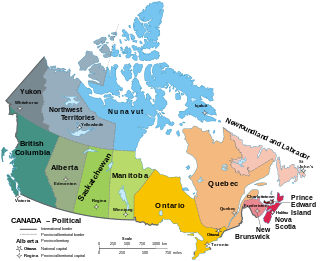
The provinces and territories of Canada are sub-national divisions within the geographical areas of Canada under the jurisdiction of the Canadian Constitution. In the 1867 Canadian Confederation, three provinces of British North America—New Brunswick, Nova Scotia, and the Province of Canada —united to form a federation, becoming a fully independent country over the next century. Over its history, Canada's international borders have changed several times, and the country has grown from the original four provinces to the current ten provinces and three territories. Together, the provinces and territories make up the world's second-largest country by total area.
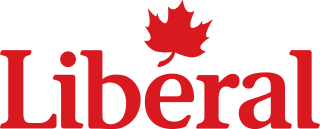
The Liberal Party of Canada is the longest-serving and oldest active federal political party in Canada. The party has dominated federal politics of Canada for much of its history, holding power for almost 70 years of the 20th century. As a result, it has sometimes been referred to as Canada's "natural governing party".
The Conservative Party of Canada, colloquially known as the Tories, is a federal political party in Canada. It was formed in 2003 from the multiple right-leaning parties which had existed in Canada for over a century, historically grouped into two camps known as the "Red Tories" and the "Blue Tories". The party sits at the centre-right to the right of the Canadian political spectrum, with their federal rivals, the Liberal Party of Canada, positioned to their left. The Conservatives are defined as a "big tent" party, practising "brokerage politics" and welcoming a broad variety of members. The party's current leader is Erin O'Toole, who serves as Leader of the Official Opposition.

Justin Pierre James Trudeau is a Canadian politician who is the 23rd and current prime minister of Canada since November 2015 and the leader of the Liberal Party since 2013. Trudeau is the second-youngest prime minister in Canadian history after Joe Clark; he is also the first to be the child or other relative of a previous holder of the post, as the eldest son of Pierre Trudeau.

Canada is a country in North America. Its ten provinces and three territories extend from the Atlantic to the Pacific and northward into the Arctic Ocean, covering 9.98 million square kilometres, making it the world's second-largest country by total area. Its southern and western border with the United States, stretching 8,891 kilometres (5,525 mi), is the world's longest bi-national land border. Canada's capital is Ottawa, and its three largest metropolitan areas are Toronto, Montreal, and Vancouver.

Montreal is the second-most populous city in Canada and most populous city in the Canadian province of Quebec. Founded in 1642 as Ville-Marie, or "City of Mary", it is named after Mount Royal, the triple-peaked hill in the heart of the city. The city is centred on the Island of Montreal, which obtained its name from the same origin as the city, and a few much smaller peripheral islands, the largest of which is Île Bizard. The city is situated 196 km (122 mi) east of the national capital Ottawa, and 258 km (160 mi) south-west of the provincial capital, Quebec City.
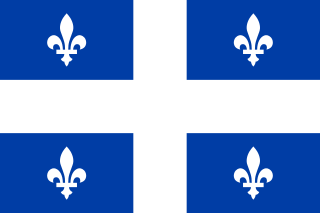
Quebec is one of the thirteen provinces and territories of Canada. Quebec is the largest province by area and the second-largest by population. Much of the population lives in urban areas along the St. Lawrence River, between the most populous city, Montreal, and the provincial capital, Quebec City. Quebec is the home of the Québécois nation. Located in Central Canada, the province shares land borders with Ontario to the west, Newfoundland and Labrador to the northeast, New Brunswick to the southeast, and a coastal border with Nunavut; in the south it borders Maine, New Hampshire, Vermont, and New York in the United States.
The New Democratic Party is a social democratic federal political party in Canada. The party was founded in 1961 by the Co-operative Commonwealth Federation (CCF) and the Canadian Labour Congress (CLC). On the political spectrum, the party sits to the left of the Liberal Party.
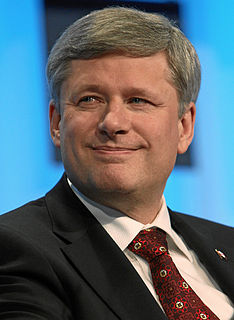
The 2011 Canadian federal election was held on May 2, 2011, to elect members to the House of Commons of Canada of the 41st Canadian Parliament.
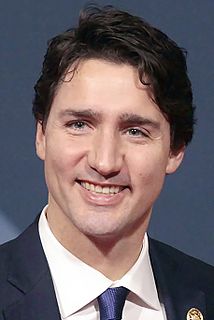
The 2015 Canadian federal election was held on October 19, 2015, saw the Liberal Party, led by Justin Trudeau, win 184 seats, allowing it to form a majority government with Trudeau becoming the next prime minister.

The 2019 Canadian federal election was held on October 21, 2019, members of the House of Commons were elected to the 43rd Canadian Parliament. The writs of election for the 2019 election were issued by Governor General Julie Payette on September 11, 2019.
The People's Party of Canada is a federal political party in Canada. The party was formed by Maxime Bernier in September 2018, shortly after his resignation from the Conservative Party of Canada. Bernier, a former candidate for the 2017 Conservative Party of Canada leadership election and cabinet minister, was the party's only Member of Parliament (MP) from its founding in 2018 to his defeat in the 2019 Canadian federal election. The PPC formed electoral district associations (EDAs) in 326 ridings, and ran candidates in 315 ridings, of Canada's total 338 ridings, in the 2019 federal election; however, no candidate was elected under its banner and Bernier lost his bid for personal re-election in Beauce. They ran 312 candidates in the 2021 Canadian federal election; none were elected to parliament, despite a gain in the popular vote to five percent.

The 2021 Canadian federal election was held on September 20, 2021, to elect members of the House of Commons to the 44th Canadian Parliament. The writs of election were issued by Governor General Mary May Simon on August 15, 2021, when Prime Minister Justin Trudeau requested the dissolution of parliament for a snap election.














